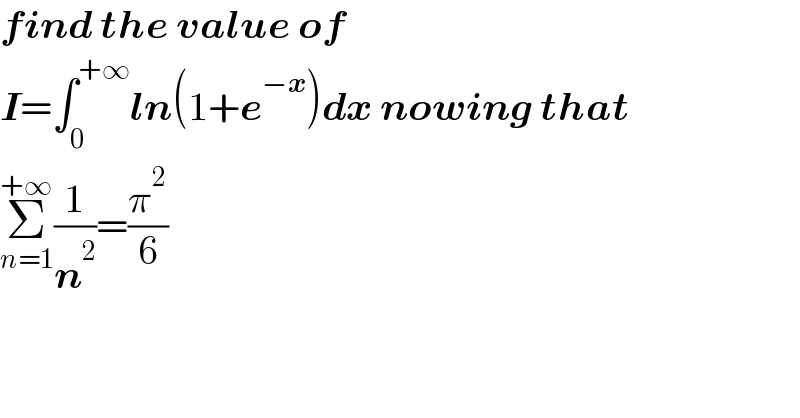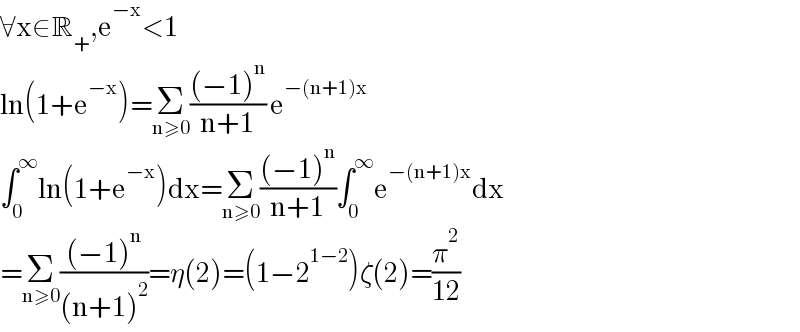
Question Number 204569 by pticantor last updated on 21/Feb/24

$$\boldsymbol{{find}}\:\boldsymbol{{the}}\:\boldsymbol{{value}}\:\boldsymbol{{of}}\: \\ $$$$\boldsymbol{{I}}=\int_{\mathrm{0}} ^{+\infty} \boldsymbol{{ln}}\left(\mathrm{1}+\boldsymbol{{e}}^{−\boldsymbol{{x}}} \right)\boldsymbol{{dx}}\:\boldsymbol{{nowing}}\:\boldsymbol{{that}}\: \\ $$$$\underset{{n}=\mathrm{1}} {\overset{+\infty} {\sum}}\frac{\mathrm{1}}{\boldsymbol{{n}}^{\mathrm{2}} }=\frac{\pi^{\mathrm{2}} }{\mathrm{6}} \\ $$
Answered by witcher3 last updated on 22/Feb/24

$$\forall\mathrm{x}\in\mathbb{R}_{+} ,\mathrm{e}^{−\mathrm{x}} <\mathrm{1} \\ $$$$\mathrm{ln}\left(\mathrm{1}+\mathrm{e}^{−\mathrm{x}} \right)=\underset{\mathrm{n}\geqslant\mathrm{0}} {\sum}\frac{\left(−\mathrm{1}\right)^{\mathrm{n}} }{\mathrm{n}+\mathrm{1}}\:\mathrm{e}^{−\left(\mathrm{n}+\mathrm{1}\right)\mathrm{x}} \: \\ $$$$\int_{\mathrm{0}} ^{\infty} \mathrm{ln}\left(\mathrm{1}+\mathrm{e}^{−\mathrm{x}} \right)\mathrm{dx}=\underset{\mathrm{n}\geqslant\mathrm{0}} {\sum}\frac{\left(−\mathrm{1}\right)^{\mathrm{n}} }{\mathrm{n}+\mathrm{1}}\int_{\mathrm{0}} ^{\infty} \mathrm{e}^{−\left(\mathrm{n}+\mathrm{1}\right)\mathrm{x}} \mathrm{dx} \\ $$$$=\underset{\mathrm{n}\geqslant\mathrm{0}} {\sum}\frac{\left(−\mathrm{1}\right)^{\mathrm{n}} }{\left(\mathrm{n}+\mathrm{1}\right)^{\mathrm{2}} }=\eta\left(\mathrm{2}\right)=\left(\mathrm{1}−\mathrm{2}^{\mathrm{1}−\mathrm{2}} \right)\zeta\left(\mathrm{2}\right)=\frac{\pi^{\mathrm{2}} }{\mathrm{12}} \\ $$
Commented by pticantor last updated on 23/Feb/24

$${pls}\:{how}\:{do}\:{you}\:{manage}\:{to}\:{have}\:\left(\mathrm{1}−\mathrm{2}^{\mathrm{1}−\mathrm{2}} \right)\zeta\left(\mathrm{2}\right)? \\ $$
Commented by witcher3 last updated on 23/Feb/24

$$\underset{\mathrm{n}\geqslant\mathrm{0}} {\sum}\frac{\left(−\mathrm{1}\right)^{\mathrm{n}} }{\left(\mathrm{n}+\mathrm{1}\right)^{\mathrm{2}} }=\underset{\mathrm{n}\geqslant\mathrm{0}} {\sum}\frac{\mathrm{1}}{\left(\mathrm{2n}+\mathrm{1}\right)^{\mathrm{2}} }−\frac{\mathrm{1}}{\mathrm{4n}^{\mathrm{2}} } \\ $$$$=\Sigma\left(\frac{\mathrm{1}}{\mathrm{n}^{\mathrm{2}} }−\frac{\mathrm{1}}{\left(\mathrm{2n}\right)^{\mathrm{2}} }−\frac{\mathrm{1}}{\mathrm{4n}^{\mathrm{2}} }\right)=\Sigma\frac{\mathrm{1}}{\mathrm{n}^{\mathrm{2}} }−\frac{\mathrm{1}}{\mathrm{2}}\Sigma\frac{\mathrm{1}}{\mathrm{n}^{\mathrm{2}} }=\zeta\left(\mathrm{2}\right)−\frac{\mathrm{1}}{\mathrm{2}}\zeta\left(\mathrm{2}\right)=\left(\mathrm{1}−\mathrm{2}^{\mathrm{1}−\mathrm{2}} \right)\zeta\left(\mathrm{2}\right) \\ $$
